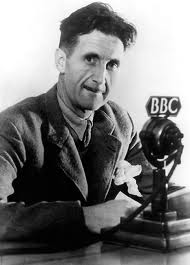The revelation that JK Rowling is the author behind the warmly received novel The Cuckoo's Calling has caused quite a stir! But Rowling is far from the first famous author to adopt a pseudonym; indeed, she joins a rich literary tradition of the pen name--illustrious authors like Charles Dickens and Mark Twain have also used noms de guerre. Today we'll explore twentieth-century authors who opted to publish under different names.
Agatha Christie
 |
The famous creator of Hercule Poirot and Miss Marple built quite a name for herself as a writer of mystery novels. When Agatha Christie decided to try her hand at a different genre, she also decided to use a different name: Mary Westmacott. She wrote her first Westmacott novel, Giant's Bread, with a "rather guilty feeling," which she relished. Even though her real identity was discovered in 1949, Christie published two more Westmacott novels. In 1950, Christie was invited to attend a celebration of her work and said, "Thank you for asking me to meet Agatha Christie. If you don't mind, I am bringing my old friend Mary Westmacott with me." |
Eric Blair
 |
Though Eric Blair aspired to an authorial career, he didn't feel that he'd made a sufficient name for himself. When it came time to publish, he opted for a name that echoed his deep love of England: George Orwell. George is the patron saint of England, and in 1933 when Blair began publishing in New Adelphi, George V was the monarch of Great Britain. Orwell was the name of a river in Suffolk, and one of Blair's favorite spots in England. It was also the name of a village Blair had visited in Cambridge. |
CS Lewis
 |
When noted author and theologian decided to turn his attention to verse, he also wanted to avoid damaging his reputation as a don at Oxford University. Thus, he published both Spirits in Bondage and Dymer under the name Clive Hamilton. He also published A Grief Observed pseudonymously, with the pen name NW Clerk. The work was so personal, he wanted to distance himself from it professionally.
|
Edward Gorey
 |
Author and illustrator Edward Gorey published over 100 books, and he remains an incredibly popular figure among collectors of children's books. Gorey was incredibly fond of word games, especially anagrams, and he often adopted pseudonyms that were anagrams of his real name (such as Ogdred Weary). He wrote The Evil Garden and The Tuning Fork, which he claimed were translated from German, with the pen name Eduard Blutig. "Blutig" is German for "bloody," a synonym for "gory." |
Theodor Geisel
 |
Many people don't even know the real name of Dr. Seuss, whose whimsical illustrated children's books have become modern classics. But this wasn't even Geisel's first pen name! In high school, Geisel frequently contributed "grinders" (one liners) to the school newspaper with the pseudonym Peter Pessimist. Soon after, he began using Theo Lesieg--spelling his last name backwards. When he began writing cartoons and other pieces for Judge, Geisel wanted to save his real name for the novel he planned to write and began using Dr. Theophrastus Seuss. Theophrastus was the name of a beloved stuffed dog, and Seuss was his mother's maiden name. Because Geisel published a variety of cartoons, essays, and stories that were much more adult in nature, it made sense for him to create a separate persona for his children's books. |
Stephen King
 |
When the news broke about JK Rowling, Stephen King almost immediately voiced his empathy for Rowling and her desire to publish under an unrecognized name. King himself has done the same thing, and descried it as "a blessed relief, to write in anonymity." King made a name for himself relatively early in his career, and he soon decided to publish under then name Richard Bachman. He used the name for four novels, but it wasn't too long before someone recognized the similarities between King's and Bachman's writing styles. King observed that in the internet age, he'd probably be detected even more quickly. |
Dean Koontz
 |
Prolific author Dean Koontz has used multiple pen names throughout his career, though now these works have been reissued under his own name. Koontz identified two primary reasons for using a pen name. First, writers who publish more than one book per year are often dismissed by the critics. And second, authors who write outside their original genre often experience low sales, which can hurt their reputations. Koontz acquiesced to his publishers' requests for pseudonyms, and because he enjoyed writing in a variety of genres, he also ended up with a variety of pseudonyms. One more successful one was Owen West, under which Koontz published two bestselling novels. |
Michael Crichton
 |
It was as a student at Harvard Medical School that Michael Crichton began his writing career. By that time, he was already extremely tall--6 feet, 9 inches, to be exact. Thus he chose pseudonyms that played on this personal trait. The first John Lange incorporates the German surname for "Long." Crichton also used Jeffrey Hudson, after Sir Jeffrey Hudson, the dwarf from the court of the Queen Consort Henrietta Maria of England. Crichton recounts in Travels that he got to eavesdrop on doctors discussing the flaws of Andromeda Strain because they didn't know he was the author. Crichton also co-wrote Dealing with his brother Douglas using the name Michael Douglas. Crichton's mother provided a picture of the brothers together when they were very young to use on the book's dust jacket. |

Kristin Masters
Master Content Brain. You think it, she writes it, no good thought remains unposted. Sprinkles pixie dust on Google+, newsletters, blog, facebook, twitter and just about everything else.
















